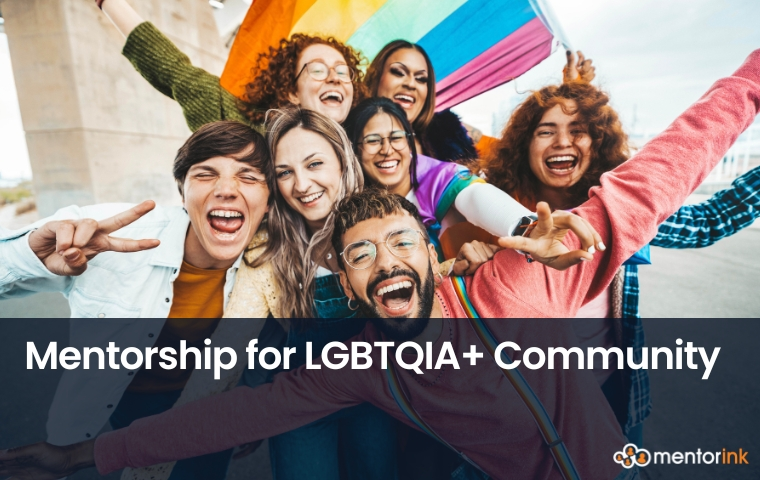
June is more than just the beginning of summer, but it is also a celebration of visibility, progress, and resilience for millions around the globe. Pride Month can be seen as a powerful reminder of how far the LGBTQIA+ community has come and how far there is still to go. One area where progress continues to be essential is within the workplace, where diversity, equity, and inclusion (DEI) efforts aim to level the playing field. And in that journey, mentorship for LGBTQIA plays a quietly powerful role, especially for individuals navigating their careers while also navigating their identities. Mentorship for LGBTQIA+ is not just helpful for professionals. It builds confidence, opens doors, and helps people feel seen and supported.
What Is Pride Month?
Pride Month, celebrated every June, honors the 1969 Stonewall Riots, which were an uprising led largely by trans women of color standing up against police brutality at the Stonewall Inn in NYC. That moment ignited the LGBTQIA+ rights movement and set the stage for Pride as we know it today.
But Pride has grown into more than just a tribute to the past. It is a celebration of identity, resilience, and community and a powerful reminder of the work still ahead. Even now, LGBTQIA+ individuals face real challenges like workplace bias, mental health struggles, and being overlooked for leadership roles.
Pride should be seen as more than just rainbows and parades. It is really about making LGBTQIA+ voices heard, seen, and valued, not just in June, but every day. In the workplace, that means ensuring fair policies, inclusive environments, and access to support systems like mentorship, which can truly change the game for professional growth and well-being.
Importance of DEI for LGBTQIA+ Community in the Workplace
Workplaces that embrace Diversity, Equity, and Inclusion (DEI) do not just perform better, but they become safer, more innovative environments for everyone. For LGBTQIA+ professionals. Workplaces having a strong DEI culture can mean the difference between surviving and thriving.
Unfortunately, not all workplaces are created equal. According to the Human Rights Campaign, LGBTQIA+ employees are significantly more likely to feel isolated or to experience microaggressions at work. HRC research shows that
- 84% of LGBTQ+ workers are out to at least one person at their current job, compared to 54% in 2018’s A Workplace Divided report.
- 40% of LGBTQ+ workers have withheld their identity at work due to fear of stigma or violence.
- 35% of LGBTQ+ workers have heard colleagues make jokes or negative comments about gay, lesbian, or transgender people.
- 31% of LGBTQ+ workers say their colleagues seem uncomfortable when they talk about their sexual orientation.
- 45% of transgender and non-binary workers report that colleagues appear uncomfortable when they discuss their gender identity.
- 54% of transgender and non-binary workers say they have felt unhappy or depressed at work.
A well-structured DEI strategy in the workplace ensures that:
- LGBTQIA+ individuals feel respected and heard.
- Workplace policies actively protect against discrimination and harassment.
- Queer representation exists at all levels of leadership.
But DEI is not only about policies and HR training; it is also about everyday relationships and opportunities. And that is where mentorship for LGBTIA+ steps in as a deeply human and transformative element of inclusion.
How Mentorship Helps LGBTQIA+ Community in the Workplace
Mentorship plays a pivotal role in supporting LGBTQIA+ employees in the workplace, particularly for those at the beginning of their careers or in environments still progressing toward inclusivity. Effective mentorship goes beyond standard professional guidance; it fosters encouragement, advocacy, and a critical sense of belonging.
For LGBTQIA+ professionals, mentorship for LGBTQIA+ often provides much-needed validation. Open conversations about workplace challenges such as experiences with misgendering, navigating organizational dynamics, or decisions about sharing personal identity can be both healing and empowering.
Mentors who share similar experiences or are strong allies offer invaluable insights. Their support can help mentees approach unique professional scenarios with confidence, whether it involves coming out at work, negotiating inclusive benefits, or addressing bias in a constructive and secure manner.
Mentorship also enhances visibility. When LGBTQIA+ individuals are supported and empowered, they are more likely to pursue and attain leadership roles. This visibility helps shape a more inclusive workplace culture and demonstrates the value of diversity at all levels of an organization.
How to Choose the Best Mentor for LGBTQIA+ People
Choosing the right mentor for LGBTQI is a deeply personal journey, and for LGBTQIA+ professionals, it often comes with added layers of complexity. The best mentor is not just someone with a strong résumé. They should be someone who understands, respects, and uplifts your identity while guiding your career path.
Shared Values Matter
Look for a mentor who genuinely believes in equity, inclusion, and respect for identity. They do not necessarily need to identify as LGBTQIA+ themselves, but they should be someone who listens without judgment, affirms who you are, and supports you unconditionally. The foundation of a good mentorship is trust and shared values are where that begins.
Lived Experience or Empathy
It is incredibly powerful to have a mentor who’s walked a similar path. But even if they have not, they should at least be a visible and active ally. Have they shown support for LGBTQIA+ causes? Do they participate in DEI efforts at work? Have they been vocal in uplifting marginalized voices? The key is authenticity because true allyship is shown through consistent action, not just words.
Accessibility and Availability
Even the most inspiring mentor can fall short if they are unavailable. Mentorship is a two-way street that requires commitment, time, and consistent communication. Before choosing a mentor, be sure they have the capacity to invest in the relationship. That might mean regular check-ins, feedback sessions, or simply being responsive and engaged.
Comfort, Chemistry, and Trust
A successful mentorship flourishes when both parties feel comfortable and respected. As an LGBTQIA+ mentee, you should feel safe discussing professional goals, identity challenges, or workplace dynamics without fear of being judged, dismissed, or tokenized. Emotional safety is just as crucial as career advice.


